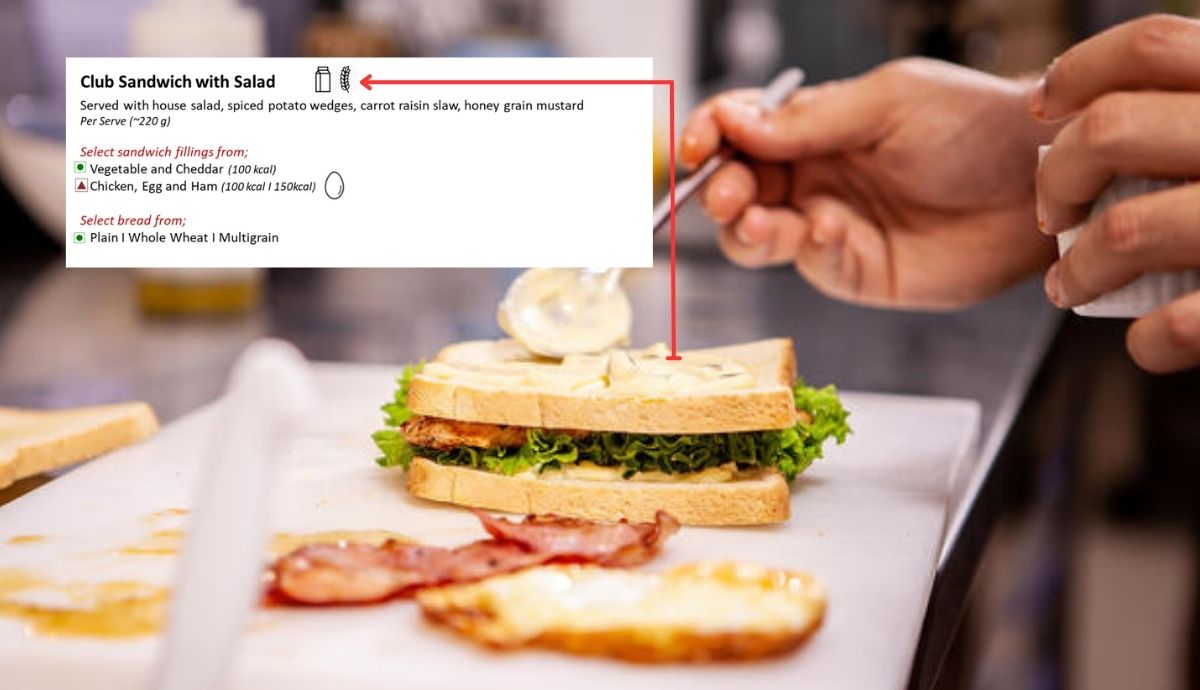Allergen Management in FSSAI Menu Labelling Regulations for Restaurants, Hotels and QSRs
April 18, 2023

Food needs to be a pleasure for everyone, including those with food allergies. Food allergies are on the rise, and so is the demand for safe dining options. The recently release, much talked about FSSAI Menu Labelling regulations for hotels, restaurants, quick service restaurants has emphasised on Allergen declaration as one of the core mandatory declarations on the menu card.
In this blog, we will discover the untapped potential of Menu Labelling and Allergen Management in attracting and retaining customers in today's competitive food service industry. Creating a safe haven for food-sensitive diners is not only the right thing to do, but also a smart business move.
About the FSSAI Menu Labelling Regulation on Allergen Declaration
The FSSAI (Labelling and Display) Regulation, 2020 states that
“Food Service Establishments shall also mention the information specified below against the food items displayed on the menu cards or boards:
a) information relating to food allergens as prescribed under sub-regulations 5 (14) of these regulations:
Provided that the allergens may be depicted by easy to understand symbols.”
The FSSAI Menu Labelling Regulations explains in detail the 8 allergens that are mandated for declaration on the menu card or the menu board, against each menu items, in text or easy to comprehend symbols, for hotels, restaurants, QSRs.

Types of allergens and the specific terms used to declare them, along with icon reference.
To know more on how to correctly declare Food allergens for Packed food, refer blog How to declare food allergens on food products correctly? | Information Center (foodlabelsolutions.com)
Importance of Allergen Management
Ensuring the safety of customers with allergies is a crucial responsibility for any food establishment. Effective Menu Labelling and Allergen Management can make dining out a safe and enjoyable experience for all.
Allergen Management is critical for Hotels, restaurants, and QSRs for the following reasons –
Legal and Regulatory Compliance: Allergen Management is crucial for restaurants to comply with food safety regulations and avoid regulatory liabilities. Failure to properly manage allergens in Menu Labelling and food preparation can result in non-compliance.
Customer Safety: Managing food allergens is essential to ensure the safety of customers with food allergies or sensitivities. Providing accurate allergen information on menus and diligently avoiding cross-contamination during food preparation can prevent potentially life-threatening allergic reactions and protect the health and well-being of customers.
Business Reputation: Proper Allergen Management can significantly impact a restaurant's reputation. By demonstrating a commitment to food safety and accommodating customers with dietary restrictions, restaurants can build trust, gain positive reviews, and foster customer loyalty. On the other hand, incidents of allergen-related issues can harm a restaurant's reputation, resulting in negative reviews, and a damaged brand image.
10 critical points for building an effective Allergen Management SOP
Allergen Management is an ongoing process that requires regular monitoring, training, and updates. By incorporating these critical points into the Allergen Management SOP of any food service establishment, we can help ensure the safety and well-being of customers with food allergies or sensitivities.
Allergen Identification: Clearly identify and list all potential allergens present in the ingredients and food items used in the restaurant's menu. This includes common allergens such as nuts, dairy, eggs, wheat, soy, fish, and shellfish. Accurate allergen identification is the foundation of effective Allergen Management.
Supplier Verification: Verify and validate the allergen information provided by ingredient suppliers, especially packed HoReCa ingredients. Ensure that they follow proper Allergen Management practices and provide accurate and up-to-date information about potential allergens in their products.
Cross-Contamination Prevention: Establish strict protocols to prevent cross-contamination of allergens during food preparation, cooking, and serving. This may include separate cutting boards, utensils, and preparation areas for allergenic and non-allergenic ingredients, as well as proper cleaning and sanitation procedures. Store all allergen-containing foods or ingredients in designated areas, and properly seal and label any partially used allergen-containing packets.
Clear Labelling and Communication: Implement clear labelling practices on menus, food packaging, and serving plates to indicate the presence of allergens in dishes. Ensure that customers are informed about potential allergens in the food they are ordering, and encourage them to communicate their allergies or sensitivities to restaurant staff.

A sample Menu Label, clearly indicating the Allergen and Nutritional information for the given serve size.
Staff Training and Education: Train all restaurant staff on the importance of Allergen Management, including proper allergen identification, handling, and cross-contamination prevention. Regularly update their knowledge on food allergies and sensitivities, and provide resources for reference, such as allergen charts and ingredient lists.
Emergency Preparedness: Develop protocols for handling allergen-related emergencies, such as an allergic reaction occurring in the restaurant. This may include staff training on recognizing the signs of an allergic reaction, knowing how to administer first aid, and having emergency contact information readily available.
In addition the above crucial points, Restaurants, Hotels, QSRs can also include the following points in their SOP
Allergen-Free Menu Options: Offer allergen-free menu options for customers with severe allergies or sensitivities. Ensure that these options are prepared separately from allergenic ingredients and are clearly labelled to avoid any cross-contamination risks.
Documentation and Record Keeping: Maintain thorough documentation and record keeping of all allergen-related information, including ingredient lists, product specifications, cleaning and sanitation procedures, staff training records, and customer communication logs. These records can serve as important references and evidence of compliance with Allergen Management protocols.
Regular Audits and Reviews: Conduct regular audits and reviews of the Allergen Management SOP to ensure that it remains effective and up-to-date. This may include reviewing ingredient lists, checking for changes in supplier practices, updating staff training, and evaluating customer feedback.
Continuous Improvement: Foster a culture of continuous improvement when it comes to Allergen Management. Encourage staff to provide feedback and suggestions for improving the SOP, and regularly evaluate and update the procedures based on new information, industry best practices, and regulatory changes.
Incorporating these best practices into the Allergen Management SOP can strengthen a restaurant's reputation and ensure the safety of customers with food allergies or sensitivities.
Food allergies are real, and so are the solutions. These cutting-edge strategies of Menu Labelling and Allergen Management will allow Restaurants, Hotels, QSRs and all food service establishments to confidently serve delicious meals to their guests, without compromising on safety.
About LabelBlind®
Established in 2018 and based in Mumbai, LabelBlind® specialises in the area of Digitising Food Labelling and Regulatory Compliance. FoLSol® by LabelBlind® presents India’s 1st Digital Food Labelling Solution. The SaaS platform supports Food Businesses to be Labelling Compliant and Build Consumer Trust. FoLSol® by LabelBlind® is designed to strengthen the food labelling ecosystem across a wide spectrum of services including, Packed Food Labelling, Menu Labelling, Exports Labelling, Nutraceuticals and Food Supplements Labelling and Labelling for Ecommerce players. FoLSol® Digital Food Labelling Solution is fast, accurate, and cost effective. The company is ISO9001 certified in its processes.
References
FSSAI Food Safety and Standards (Labelling and Display) Regulations, 2020. https://fssai.gov.in/upload/notifications/2020/12/5fd87c6a0f6adGazette_Notification_Labelling_Display_14_12_2020.pdf
FSSAI Guidance Note on Display of Information in Food Service Establishments (Menu Labelling), 2022. https://www.fssai.gov.in/upload/uploadfiles/files/Guidance_Note_Labelling_23_02_2022.pdf
The Importance of Allergen Management in Food Industry, PECB, 2014. The Importance of Allergen Management in Food Industry | PECB
Guidance Document: Food Safety Management Systems- Food Industry Guide To Implement GMP/GHP Requirements and Risk Assessment, Health Supplements and Nutraceuticals. 2018. Food Safety Management Systems Guidance Document for Food Supplements (fssai.gov.in)

Olivia Crasto (MSc in Food Processing & Preservation)
Olivia is a Learner for Life, Eco enthusiast and loves to experience nature and its beauty
